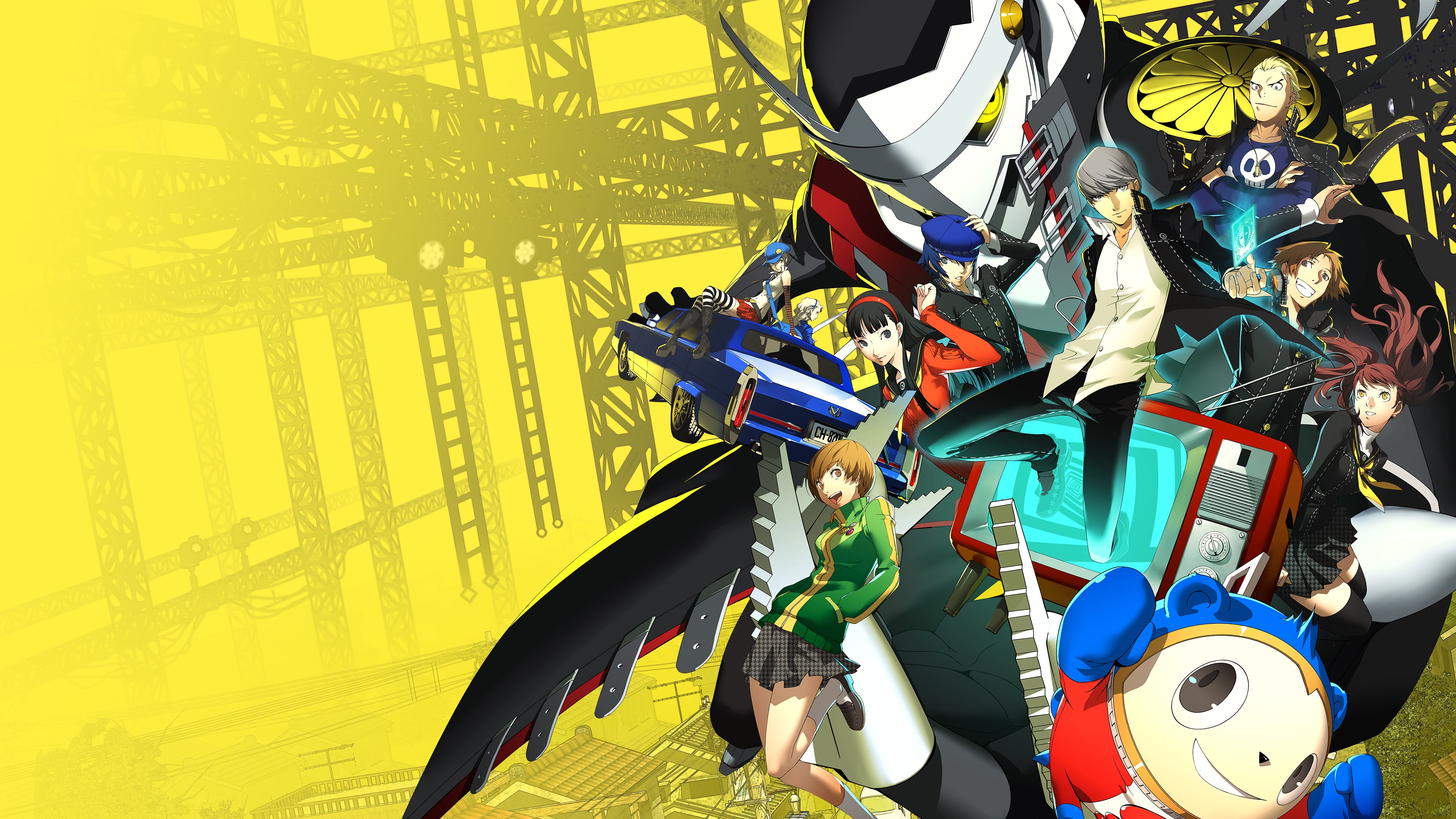Introduction

Welcome to the enthralling world of Persona 4 Golden, a masterpiece in the role-playing game genre that combines intriguing mystery elements with deep psychological exploration. Since its release, this enhanced version of the original Persona 4 has captivated gamers with its complex storytelling, immersive gameplay, and vivid character arcs, becoming a beloved classic in the Persona series.
Persona 4 Golden transports players to the quiet town of Inaba, where our protagonist, a high school student, moves to live with his uncle and cousin for a year. However, the rural calm is soon shattered by a string of bizarre murders and mysterious events that seem to revolve around a strange television channel. This channel broadcasts only at midnight during rainy days, showing what appears to be the dark desires of people and potentially their fates.
As players delve into this gripping narrative, they navigate dual realities: the mundane life of a typical Japanese high school student attending classes, forming friendships, and participating in daily activities; and the thrilling, dangerous adventures in a shadowy, supernatural world inside the TV. This balance of everyday life and extraordinary encounters forms the core of Persona 4 Golden's gameplay, blending traditional RPG mechanics with simulation elements in a way that feels both innovative and engaging.
The game's mechanics are a significant draw, featuring a mix of strategic turn-based combat, persona management, and social interactions known as "Social Links." These Social Links deepen the story, providing insights into the characters' personal growth and unlocking new abilities and personas to use in battle against the malevolent forces lurking in the TV world. Each character's development is not just about gaining power but also about personal revelations and overcoming their inner shadows and fears.
Persona 4 Golden also stands out for its striking visual style and compelling soundtrack, which perfectly complement the emotional depth and suspenseful atmosphere of the game. The themes of searching for the truth, facing one's inner self, and the impact of relationships and community resonate deeply, offering players not just a game but an introspective journey.
Through this introduction to Persona 4 Golden, we invite both longtime fans and newcomers to explore the secrets of Inaba, unravel the mysteries behind the Midnight Channel, and discover what it truly means to seek out and live one's truth. Join us as we dive deeper into the aspects that make Persona 4 Golden a defining game in the RPG landscape and a profound narrative experience that challenges the conventions of storytelling in video games.
Gameplay and Mechanics

In Persona 4 Golden, the gameplay and mechanics offer an intricate blend of traditional Japanese RPG elements with an engaging life simulation that sets it apart in the gaming world. This unique fusion creates a richly textured gameplay experience that captivates players with its depth and variety.
At the heart of the game is the day-to-day life of the protagonist in the rural town of Inaba. Players live out a year in the life of this high school student, managing both his social activities and his secret adventures into the mysterious TV world—a parallel dimension where the game’s combats take place. This dual-life system challenges players to balance dungeon-crawling quests with school life, part-time jobs, and relationships, making time management a crucial aspect of the gameplay.
The Social Link system is one of Persona 4 Golden's most celebrated features. Players can build and improve relationships with characters from the story, each represented by a major arcana card. Developing these Social Links confers substantial benefits in the TV world battles, including creating stronger Personas. The Personas, manifestations of a character’s psyche that can be summoned in battles, are central to combat. They can be fused and customized, giving players extensive control over how their battle abilities develop.
Combat in Persona 4 Golden is turn-based, requiring strategic thinking and planning. Players must exploit enemy weaknesses to gain an advantage, and choosing the right Personas for each battle is critical. The game introduces a variety of enemy types and complex bosses that challenge players to constantly refine their strategies and Persona rosters.
Enhancements in Persona 4 Golden include new Personas, additional cutscenes, a new character, and new story elements, providing even more depth and context to the original plot. The game also introduces new weather elements and events that can affect both the story and interactions, offering a more dynamic experience and increasing the game's replayability.
The mechanics of Persona 4 Golden also extend to its visual and auditory design, which are integral to the gameplay experience. The vibrant visuals and memorable soundtrack enrich the immersive quality of the game, enhancing the emotional engagement and atmosphere of both the story and combat sequences.
In essence, Persona 4 Golden masterfully combines engaging story elements with complex gameplay mechanics to create a compelling, deeply narrative-driven experience. Its innovative blend of life simulation and RPG combat challenges players to think critically about their decisions and strategies both in and out of battle. This engaging mix of gameplay mechanics not only defines Persona 4 Golden as a standout title in the Persona series but also as a landmark in RPG gaming.
Plot and Setting

Persona 4 Golden unfolds in the quaint, fictional Japanese town of Inaba, a setting that transforms from a peaceful, rural community into the backdrop for mysterious and supernatural events that drive the game's plot. This unique setting serves as the perfect stage for a tale that masterfully blends daily high school life with thrilling, otherworldly adventures.
Upon his arrival in Inaba, the protagonist, a high school student sent to live with his uncle and cousin for a year, quickly discovers that this sleepy town hides dark secrets. The story kicks off when a bizarre murder mystery coincides with the rumors of the "Midnight Channel," a mysterious TV program that appears only on rainy nights, allegedly showing viewers their soulmate. However, the protagonist and his new friends soon learn that the channel is much more sinister, as it actually displays people who are about to be enveloped in a deadly fog in the real world.
The gameplay's narrative core revolves around the investigation of these murders and the exploration of the "TV World," a parallel dimension where the protagonist and his friends battle Shadows—creatures born from human psyche. Each foray into this alternate dimension is tied to the emotions and fears of people they know, adding layers of personal connection and psychological depth to the plot.
As the group delves deeper, they uncover a connection between the TV World and the murders, discovering that each victim was thrown into this alternate dimension before their deaths. This revelation propels them on a dual mission: to solve the mystery behind the murders and to save potential future victims from meeting the same fate. The small town setting of Inaba adds a layer of intimacy to the narrative, as each character the protagonist interacts with could be linked to the mystery. It creates a dense web of relationships and secrets that the players must navigate, making every interaction and every piece of dialogue crucial to unraveling the town's hidden truths.
In addition to the murder mystery, the game explores themes of identity, truth, and the masks people wear. The setting of Inaba, with its closed-off, intimate environment, amplifies these themes, as the characters are forced to confront their true selves and the facets of life they often hide from the world. The juxtaposition of the idyllic rural life and the sinister, hidden dimensions encourages players to think about the nature of reality and perception.
In Persona 4 Golden, the plot and setting are not just backdrops for the action; they are integral to the game’s emotional depth and thematic explorations. Inaba, with its charm and hidden darkness, becomes a mirror reflecting the game's core messages about the human psyche, making Persona 4 Golden a profound narrative experience that engages players on multiple levels, emotionally and intellectually.
Character Development

In Persona 4 Golden, character development transcends typical video game archetypes, presenting a cast that is both deeply relatable and dynamically complex. This development is central to the game's engagement, as each character's personal growth is intricately woven into the overarching mystery and supernatural elements of the plot, enhancing the emotional depth and resonance of the story.
At the heart of this development is the protagonist, a high school transfer student whose leadership and decisions shape the course of the narrative. Players guide him through interactions and choices that not only determine the fate of his friends but also define his own personal growth. His journey from a new, uncertain student to a decisive leader facing supernatural threats is a compelling arc that draws players deeply into the game's world.
Each of the main characters represents a specific aspect of human psychology, depicted through their Persona, a physical manifestation of their inner self. For instance, Chie Satonaka, known for her martial arts enthusiasm and vibrant energy, battles with her own feelings of inadequacy and jealousy. Her character development involves confronting these issues, which is visually and narratively represented through her Persona’s evolution. This transformation resonates with players, as it mirrors real-life struggles with self-identity and self-worth.
Yosuke Hanamura provides another layer of human complexity, dealing with grief from the loss of a loved one and the pressures of living up to societal expectations. His friendship with the protagonist and his involvement in solving Inaba’s mysteries help him to find purpose and resilience, illustrating the theme of growth through adversity. His evolution from a carefree teenager to a more thoughtful and grounded individual reflects the game's ability to handle delicate subjects with maturity and depth.
The character of Yukiko Amagi showcases the struggle with traditional roles and the desire for independence. Her initial portrayal as the demure heiress to a family business evolves beautifully as she gains confidence and autonomy, deciding her own fate rather than adhering to predetermined paths. This development is particularly impactful, as it challenges traditional gender roles and encourages self-discovery and autonomy.
Furthermore, Persona 4 Golden excels in how it develops its characters through the Social Link system. By spending time with each character, the protagonist helps them to confront and overcome their personal shadows. These interactions, while optional, are critical for character development and provide deeper insights into their personalities, fears, and aspirations. This system not only encourages players to engage more thoughtfully with the characters but also reinforces the game’s themes of truth and self-acceptance.
Persona 4 Golden thus offers a rich tapestry of character development that is rare in video games. Each character's growth is not just a side story but a fundamental aspect of the game's appeal. The detailed and empathetic portrayal of each character’s journey through internal and external challenges makes the game a profound narrative experience, resonating deeply with players long after the story concludes.
Cultural Impact and Legacy

Persona 4 Golden has carved a distinct niche in both the gaming community and wider popular culture, influencing an array of media and discussions around mental health, identity, and the power of narrative in video games. Its release not only redefined what RPGs could encapsulate in terms of depth and engagement but also left a lasting legacy that continues to be celebrated for its innovative approach to storytelling and character development.
Since its initial release, Persona 4 Golden has been lauded for its complex narrative that seamlessly integrates elements of Japanese daily life with supernatural undertones, presenting a relatable yet fantastical realm that players can dive into. The game's setting in a small, seemingly quiet town that harbors deep mysteries offered players a unique twist on traditional RPG locales, which typically favor more grandiose settings. This choice highlighted the game's central themes of truth and self-discovery, resonating deeply with a broad audience and sparking conversations about the portrayal of rural life and community ties in gaming.
The cultural impact of Persona 4 Golden is also evident in its exploration of psychological themes. Characters deal with personal issues ranging from family pressures and self-doubt to more severe aspects of mental health, such as depression and anxiety. By crafting these narratives with care and depth, the game has helped destigmatize mental health discussions among its players and critics alike, promoting a broader understanding and empathy towards such issues.
Furthermore, the game’s Social Link system offers a groundbreaking mechanic that encourages players to engage deeply with characters and their stories. Each interaction is not just about building relationships to strengthen the player's abilities but also about understanding and helping resolve other characters' internal conflicts. This system has been celebrated for encouraging emotional investment and has influenced other games in the RPG genre to adopt similar mechanics that focus on character and narrative depth.
The legacy of Persona 4 Golden extends beyond gaming into other forms of media, inspiring adaptations such as an anime series, several manga, and even a stage play. Each adaptation has helped cement its status as a cultural icon, introducing the story and characters to an even wider audience and solidifying its place in the pantheon of influential media narratives.
In essence, Persona 4 Golden has not only set a high standard for RPGs but has also impacted cultural conversations around the themes it portrays. Its legacy is evident in how it has shaped player expectations for narrative depth and character development in video games, and its cultural footprint continues to grow, influencing not just gamers but a global audience drawn to its compelling storytelling and richly woven themes.